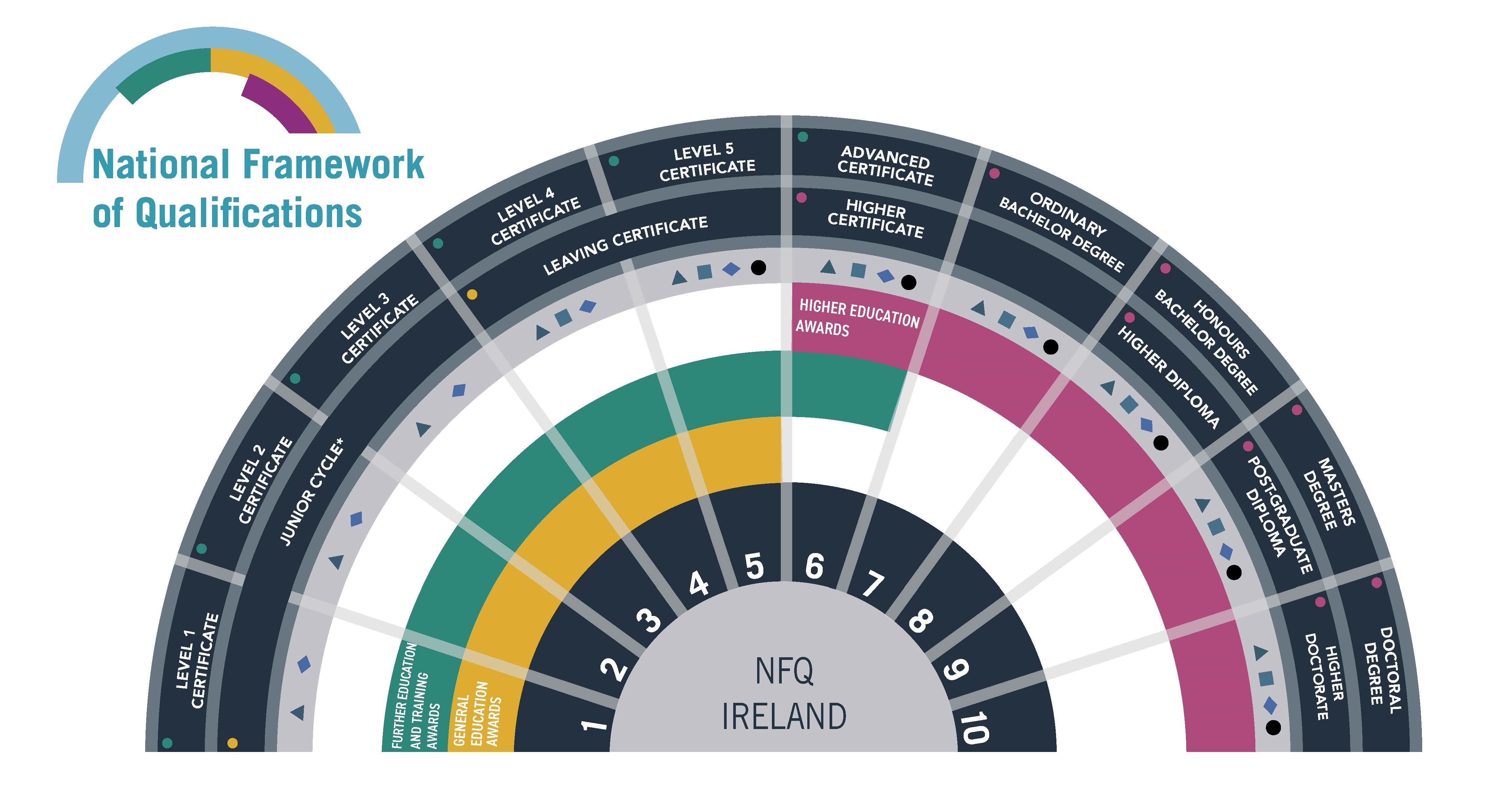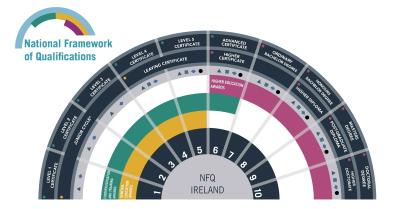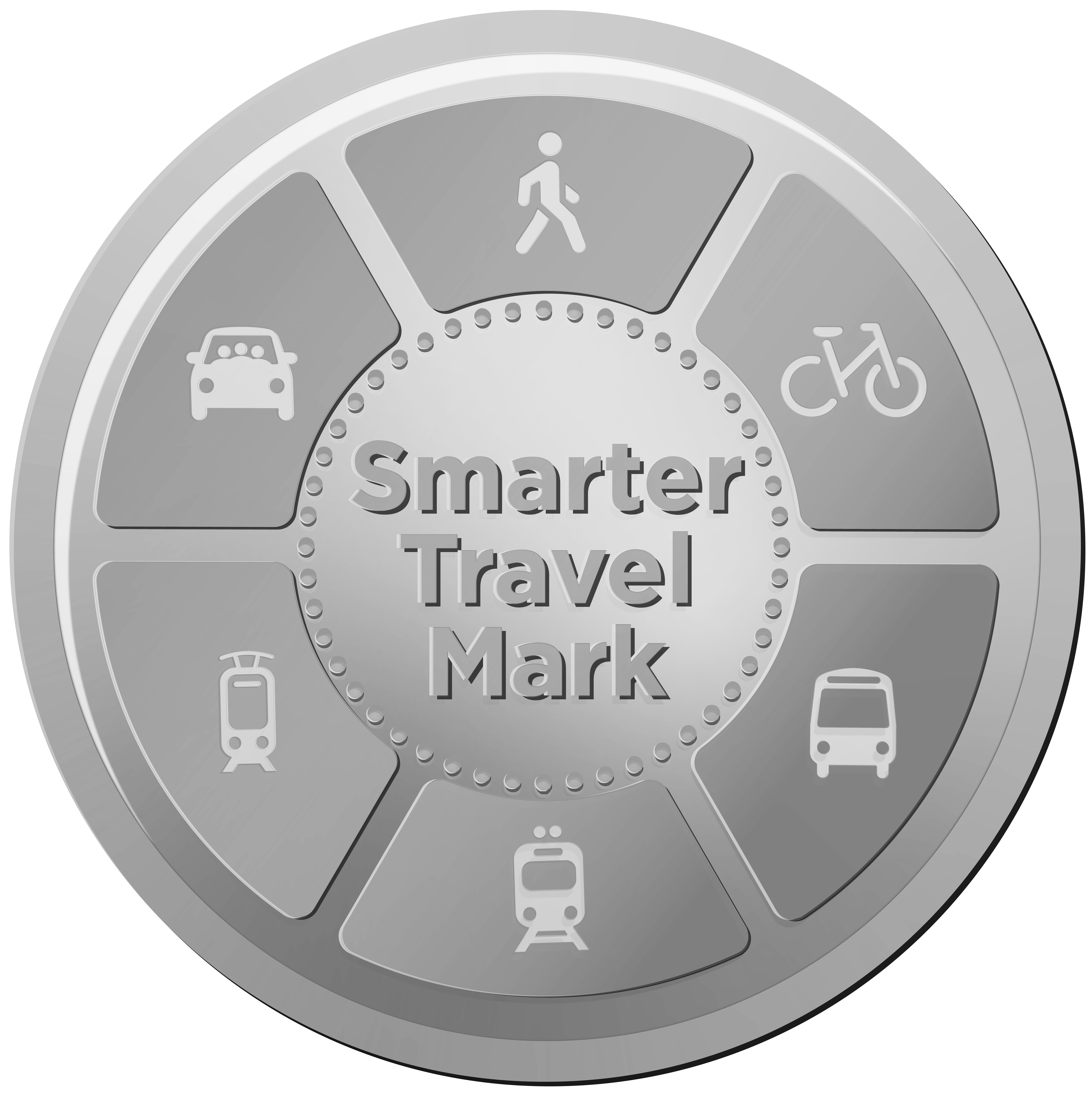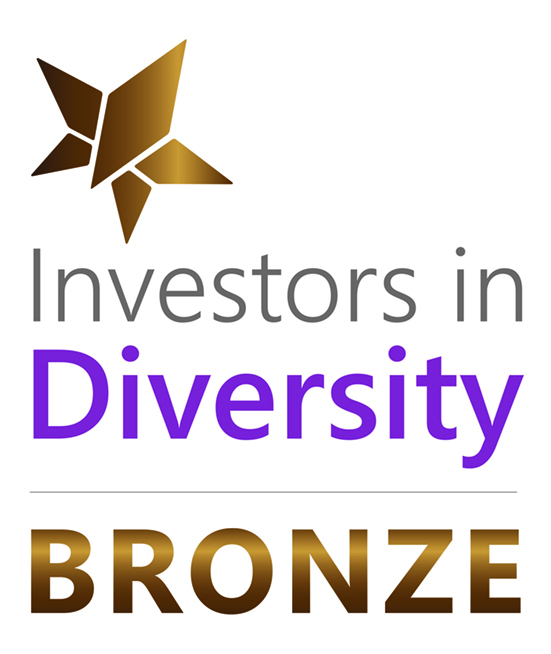NFQ grid of level indicators
The grid of level indicators describes what a learner needs to know, understand and be able to do to achieve a qualification at a particular level on the National Framework of Qualifications.



NFQ grid of level indicators
NFQ Grid Level Indicators.pdf (2 MB)|
KNOWLEDGE BREADTH |
Elementary knowledge |
|
KNOWLEDGE KIND |
Demonstrable by recognition or recall |
|
KNOW-HOW & SKILL RANGE |
Demonstrate basic practical skills and carry out directed activity using basic tools |
|
KNOW-HOW & SKILL SELECTIVITY |
Perform processes that are repetitive and predictable |
|
COMPETENCE CONTEXT |
Act in closely defined and highly structured contexts |
|
COMPETENCE ROLE |
Act in a limited range of roles |
|
COMPETENCE LEARNING TO LEARN |
Learn to sequence learning tasks; learn to access and use a range of learning resources |
|
COMPETENCE INSIGHT |
Begin to demonstrate awareness of independent role for self |
|
KNOWLEDGE BREADTH |
Knowledge that is narrow in range |
|
KNOWLEDGE KIND |
Concrete in reference and basic in comprehension |
|
KNOW-HOW & SKILL RANGE |
Demonstrate limited range of basic practical skills, including the use of relevant tools |
|
KNOW-HOW & SKILL SELECTIVITY |
Perform a sequence of routine tasks given clear direction |
|
COMPETENCE CONTEXT |
Act in a limited range of predictable and structured contexts |
|
COMPETENCE ROLE |
Act in a range of roles under direction |
|
COMPETENCE LEARNING TO LEARN |
Learn to learn in a disciplined manner in a well-structured and supervised environment |
|
COMPETENCE INSIGHT |
Demonstrate awareness of independent role for self |
|
KNOWLEDGE BREADTH |
Knowledge moderately broad in range |
|
KNOWLEDGE KIND |
Mainly concrete in reference and with some comprehension of relationship between knowledge elements. |
|
KNOW-HOW & SKILL RANGE |
Demonstrate a limited range or practical and cognitive |
|
KNOW-HOW & SKILL SELECTIVITY |
Select from a limited range of varied procedures and apply known solutions to a limited range of predictable problems. |
|
COMPETENCE CONTEXT |
Act within a limited range of contexts. |
|
COMPETENCE ROLE |
Act under direction with limited autonomy; function within familiar, homogeneous groups |
|
COMPETENCE LEARNING TO LEARN |
Learn to learn within a managed environment |
|
COMPETENCE INSIGHT |
Assume limited responsibility for consistency of self-understanding and behaviour |
|
KNOWLEDGE BREADTH |
Broad range of knowledge |
|
KNOWLEDGE KIND |
Mainly concrete in reference and with some elements of abstraction or theory |
|
KNOW-HOW & SKILL RANGE |
Demonstrate a moderate range of practical and cognitive skills and tools |
|
KNOW-HOW & SKILL SELECTIVITY |
Select from a range of procedures and apply known solutions to a variety of predictable problems |
|
COMPETENCE CONTEXT |
Act in familiar and unfamiliar contexts |
|
COMPETENCE ROLE |
Act with considerable amount of responsibility and autonomy |
|
COMPETENCE LEARNING TO LEARN |
Learn to take responsibility for own learning within a supervised environment |
|
COMPETENCE INSIGHT |
Assume partial responsibility for consistency of self-understanding and behaviour |
|
KNOWLEDGE BREADTH |
Broad range of knowledge |
|
KNOWLEDGE KIND |
Some theoretical concepts and abstract thinking, with significant depth in some areas |
|
KNOW-HOW & SKILL RANGE |
Demonstrate a broad range of specialised skills and tools |
|
KNOW-HOW & SKILL SELECTIVITY |
Evaluate and use information to plan and develop investigative strategies and to determine solutions to varied unfamiliar problems |
|
COMPETENCE CONTEXT |
Act in a range of varied and specific contexts, taking responsibility for the nature and quality of outputs; identify and apply skill and knowledge to a wide variety of contexts |
|
COMPETENCE ROLE |
Exercise some initiative and independent in carrying out defined activities; join and function with multiple, complex and heterogeneous groups |
|
COMPETENCE LEARNING TO LEARN |
Learn to take responsibility for own learning within a managed environment |
|
COMPETENCE INSIGHT |
Assume full responsibility for consistency of self-understanding and behaviour |
|
KNOWLEDGE BREADTH |
Specialised knowledge of a broad area |
|
KNOWLEDGE KIND |
Some theoretical concepts and abstract thinking, with significant underpinning theory |
|
KNOW-HOW & SKILL RANGE |
Demonstrate comprehensive range of specialised skills and tools |
|
KNOW-HOW & SKILL SELECTIVITY |
Formulate responses to well-defined abstract problems |
|
COMPETENCE CONTEXT |
Act in a range of varied and specific contexts involving creative and non-routine activities; transfer and apply theoretical concepts and/or technical or creative skills to a range of contexts |
|
COMPETENCE ROLE |
Exercise substantial personal autonomy and often take responsibility for the work of others and/or for the allocation of resources; form, and function within, multiple, complex and heterogeneous groups |
|
COMPETENCE LEARNING TO LEARN |
Learn to evaluate own learning and identify needs within a structured learning environment; assist others in identifying learning needs |
|
COMPETENCE INSIGHT |
Express an internalised, personal world view, reflecting engagement with others |
|
KNOWLEDGE BREADTH |
Specialised knowledge across a variety of areas |
|
KNOWLEDGE KIND |
Recognition of limitations of current knowledge and familiarity with sources of new knowledge; integration of concepts across a variety of areas |
|
KNOW-HOW & SKILL RANGE |
Demonstrate specialised technical, creative or conceptual skills and tools across an area of study |
|
KNOW-HOW & SKILL SELECTIVITY |
Exercise appropriate judgement in planning, design, technical and/or supervisory functions related to products, services, operations or processes |
|
COMPETENCE CONTEXT |
Utilise diagnostic and creative skills in a range of functions in a wide variety of contexts |
|
COMPETENCE ROLE |
Accept accountability for determining and achieving personal and/or group outcomes;take significant or supervisory responsibility for the work of others in defined areas of work |
|
COMPETENCE LEARNING TO LEARN |
Take initiative to identify and address learning needs and interact effectively in a learning group |
|
COMPETENCE INSIGHT |
Express an internalised, personal world view, manifesting solidarity with others |
|
KNOWLEDGE BREADTH |
An understanding of the theory, concepts and methods pertaining to a field (of fields) of learning |
|
KNOWLEDGE KIND |
Detailed knowledge and understanding in one or more specialised areas, some of it at the current boundaries of the field(s) |
|
KNOW-HOW & SKILL RANGE |
Demonstrate mastery of a complex and specialised area of skills and tools; use and modify advanced skills and tools to conduct closely guided research, professional or advanced technical activity. |
|
KNOW-HOW & SKILL SELECTIVITY |
Exercise appropriate judgement in a number of complex planning, design, technical and/or management functions related to products, services, operations or processes, including resourcing |
|
COMPETENCE CONTEXT |
Use advanced skills to conduct research, or advanced technical or professional activity, accepting accountability for all related decision-making; transfer and apply diagnostic and creative skills in a range of contexts |
|
COMPETENCE ROLE |
Act effectively under guidance in a peer relationship with qualified practitioners; lead multiple, complex and heterogeneous groups |
|
COMPETENCE LEARNING TO LEARN |
Learn to act in variable and unfamiliar learning contexts; learn to manage learning tasks independent, professionally and ethically |
|
COMPETENCE INSIGHT |
Express a comprehensive, internalised, personal world view manifesting solidarity with others |
|
KNOWLEDGE BREADTH |
A systematic understanding of knowledge, at, or informed by, the forefront of a field of learning |
|
KNOWLEDGE KIND |
A critical awareness of current problems and/or new insights, generally informed by the forefront of a field of learning |
|
KNOW-HOW & SKILL RANGE |
Demonstrate a range of standard and specialised research or equivalent tools and techniques of enquiry |
|
KNOW-HOW & SKILL SELECTIVITY |
Select from complex and advanced skills across a filed of learning; develop new skills to a high level, including novel and emerging techniques |
|
COMPETENCE CONTEXT |
Act in a wide and often unpredictable variety of professional levels and ill defined contexts |
|
COMPETENCE ROLE |
Take significant responsiblity for the work of individuals and groups; lead and initiate activity |
|
COMPETENCE LEARNING TO LEARN |
Learn to self-evaluate and take responsibility for continuing academic/professional development |
|
COMPETENCE INSIGHT |
Scrutinise and reflect on social norms and relationships and act to change them |
|
KNOWLEDGE BREADTH |
A systematic acquisition and understanding of a substantial body of knowledge which is at the forefront of a field of learning |
|
KNOWLEDGE KIND |
The creation and interpretation of new knowledge, through original research, or other advanced scholarship, of a quality to satisfy review by peers |
|
KNOW-HOW & SKILL RANGE |
Demonstrate a significant range of the principal skills, techniques, tools, practices and/or materials which are associated with a field of learning; develop new skills, techniques, tools, practices and/or materials |
|
KNOW-HOW & SKILL SELECTIVITY |
Respond to abstract problems that expand and redefine existing procedural knowledge |
|
COMPETENCE CONTEXT |
Exercise personal responsibility and largely autonomous initiative in complex and unpredictable situations, in professional or equivalent contexts |
|
COMPETENCE ROLE |
Communicate results of research and innovation to peers; engage in critical dialogue; lead and originate complex social processes |
|
COMPETENCE LEARNING TO LEARN |
Learn to critique the broader implications of applying knowledge to particular contexts |
|
COMPETENCE INSIGHT |
Scrutinise and reflect on social norms and relationships and lead action to change them |


